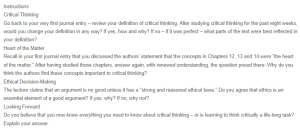Critical Thinking and Ethical Decision-Making
Critical Thinking
After studying critical thinking for the past eight weeks, I would expand my definition by emphasizing the importance of recognizing and mitigating cognitive biases. Incorporating this aspect makes me understand that critical thinking is not just about analyzing information and challenging the things one learns. Still, it is about recognizing the things we are supposed to believe and working to overcome them. This enhancement is essential because it reflects a deeper theoretical understanding of cognitive biases such as confirmatory ones. This focus on truth and openness directly corresponds to this enlarged view of critical thinking by stressing that it entails a dedication to rigorous adherence to the principles of reason and a kind of open-mindedness to multiple perspectives.
Heart of the Matter
After studying Chapters 12, 13, and 14 with renewed understanding, I acknowledge that the authors consider these ideas vital to critical thinking since they are the core knowledge instruments and thinking mechanisms. These chapters show how analogies and pattern matching help simplify cognition, ideological profiling shows how belief affects human perception, and the scientific method’s hypothesis and evidence formation reveal the cyclical nature of knowledge gaining (Facione & Gittens, 2016). Through these elements, the authors explain that critical thinking entails the assessment of knowledge and the analysis of proficiencies that define concepts and choices. This comprehensive approach is vital because it equips individuals with the skills to navigate and scrutinize complex and often contradictory information in a disciplined and reflective manner.
Ethical Decision-Making
Yes, ethics is an essential element of a good argument. Ethics serves as the starting point and provides the framework by which to construct and assess arguments. Ethic-based propositions suggest that, during the conflict, participants will give and seek fairness, honesty, and respect for each other’s opinions, making the approaches credible and trustworthy. Ethical reasoning encourages a person to be moral and not to employ any fallacies that can mislead people or be given to them to fool them (Cusimano & Lombrozo, 2023). Furthermore, ethical arguments are more effective as they contribute to creating constructive discussions and establishing consensus in the situation since this approach considers the best interests and interests engaged the subjects engaged. In academic and professional practice, protocolled ethical production guarantees the appropriate interlocution of arguments in a constructive way towards creating more knowledge and constructive decision-making processes that are in line with protecting the integrity and responsibility of discourse. Ultimately, integrating ethics into arguments enhances persuasiveness and relevance by aligning them with broader societal values and ethical standards.
Looking Forward
Learning to think critically is a lifelong task rather than a finite achievement. Though I have learned many important aspects of critical thinking concepts and tools over the eight weeks, Critical thinking is a continuing process. It should be practiced and constantly evolve according to new knowledge and data. Thus, I will broaden the sphere of my experiences and confront different opinions that help me develop critical thinking further. This continuous process is relevant because the conditions in the world and the difficulties people encounter are constantly changing, so the viewpoint can and should be altered. For this reason, learning and reflection should be sustained to prop up and elevate critical thinking skills throughout the person’s life span.
Moreover, with new studies and concepts connected to cognition and reasoning patterns, staying updated with these developments is crucial for practical critical thinking. Critical thinking is not only a skill that could be practiced but also a set of values that embrace an essential attitude towards information. So, it is crucial to question our knowledge and look for more details to avoid ignorance and logical overfatigue. Therefore, although I have delineated my existing level of critical thinking and progress so far, I must stress that I regard this as a lifelong process.
References
Cusimano, C., & Lombrozo, T. (2023). People recognize and condone their own morally motivated reasoning. Cognition, 234, 105379. https://doi.org/10.1016/j.cognition.2023.105379
Facione, P. A., Gittens, C. A. (2016). Think Critically. United Kingdom: Pearson.
ORDER A PLAGIARISM-FREE PAPER HERE
We’ll write everything from scratch
Question
Instructions
Critical Thinking
Go back to your very first journal entry – review your definition of critical thinking. After studying critical thinking for the past eight weeks, would you change your definition in any way? If yes, how and why? If no – if it was perfect – what parts of the text were best reflected in your definition?

Critical Thinking and Ethical Decision-Making
Heart of the Matter
Recall in your first journal entry that you discussed the authors’ statement that the concepts in Chapters 12, 13 and 14 were “the heart of the matter.” After having studied those chapters, answer again, with renewed understanding, the question posed there: Why do you think the authors find these concepts important to critical thinking?
Ethical Decision-Making
The lecture claims that an argument is no good unless it has a “strong and reasoned ethical base.” Do you agree that ethics is an essential element of a good argument? If yes, why? If no, why not?
Looking Forward
Do you believe that you now know everything you need to know about critical thinking – or is learning to think critically a life-long task? Explain your answer.

